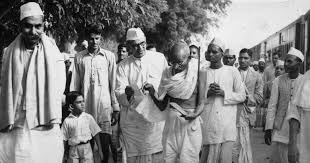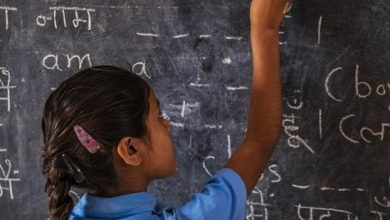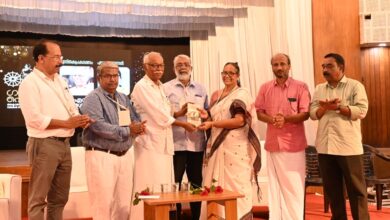Reimagining Gandhi in New Millenium
Reflections on Mahatma Gandhi: The Global Perspectives and Rethinking Mahatma Gandhi: The Global Appraisal
The Book Review of Two Books published recently titled Reflections on Mahatma Gandhi: The Global Perspectives and Rethinking Mahatma Gandhi: The Global Appraisal (eds) Terry D. Beitzel, (Director, Mahatma Gandhi Center, James Madison University, Virginia, USA) Chandrakant Langare (Dept. of English, Shivaji University, Kolhapur) Rawat publications 2021.
Prof. C. V. Venugopal
Book Review : When Gandhi was assassinated, cartoonist Abu Abraham drew a telling portrait: several blind men holding on to different parts of an elephant attempting to visualise its shape and form. And the face of the elephant was that of Gandhi! As in the popular tale, each one of them perceived a significant part of Gandhi but he in his entirety eluded them. Gandhi was astonishingly multifaceted.
It is over seventy years since his death but books and studies on him continue to be written, his views on and contributions to every imaginable aspect of human experience discussed and debated by eminent personalities as also young scholars and social activists. I am yet to come across another celebrity public figure in human history who has attracted such phenomenal global attention, during his lifetime as well as subsequently.
Yet another valuable addition to Gandhiana are the two volumes – ‘ Reflections on Mahatma Gandhi’ and ‘ Rethinking Mahatma Gandhi ‘ edited by Terry Beitzel of James Madison University, U S A and Chandrakant Langare of Shivaji University, Kolhapur, India. Carrying subtitles: Global Appraisals and Global Perspectives, they include sixty-one articles apart from an insightful foreword by Bhikhu Parekh and a thought-provoking preface by Tushar Gandhi.
The Foreword and the Preface set the tone as it were for the write ups that follow. Tushar’s Preface – Do We Need Gandhi? studies threadbare the charges by Gandhi’s critics and calls their bluff. And he makes a pertinent point: Bapu is gone; it makes no difference to him whether we remember or forget him, but if we discard Goodness, Love, Peace, Truth, Humanity and Non- violence, will we survive?
Bhikhu Parikh’s Foreword is objectively analytical and offers fresh thinking on Gandhi’s ideas and ideals, his concept of Non-violence in particular. Gandhi today has admirers and also detractors. ‘Those sympathetic to Gandhi would like to expand his relevance to more areas but lack the skill and strategy to do so. His critics on the other hand would like to reduce his relevance considerably and well know how to do it.’ Dr Parikh feels that this collection brings a suitably re-interpreted Gandhian perspective to bear on the challenges facing India and the world.
The joint Introduction by the editors practically assures the reader that it indeed does so.It is difficult to find someone of his stature’ write the editors ‘ whose influence can be traced in diverse areas such as socio-politics, arts, philosophy, science, literature and education.’ They feel that the articles reflect the many dimensions of Gandhi’s personality.
The editors themselves have contributed scholarly articles. Terry Beitzel, in his ‘ Satyagraha and the Ethics of Responsibility’ discusses how Max Weber’s ‘ ethics of responsibility’ helps a better understanding of Gandhi’s mechanism and effectiveness of non-violent principles, tactics and strategies. As he himself informs, this viewpoint is the first of its kind.
Chandrakant Langare presents an in depth critical perception of Shyam Benegal’s film ‘The Making of the Mahatma’ and one cannot agree less when he concludes ‘The film is not just visualisation of history, it is rather a holistic body of Gandhian discourse unearthing new facts about the young Mohan and his journey of making of Mahatma.’
Antonino Drago considers the various appraisals of Gandhi, especially by Western writers and concludes by agreeing with Romain Rolland that Gandhi in the East has raised a tide of the spirit that must fall on the whole world.
‘Social Facets of Gandhi and Ambedkar’ by S. Guruswamy and Jagan Karade takes a fair and unbiased look at the apparently different facets of these two great sons of India. But then, their goals were the same though their methodology was different.
Articles on topics like Gandhian Economics, Nationalism, Democracy, Untouchability, His Autobiography, Hind Swaraj are of course to be expected in such an anthology as also a consideration of Gandhi with other contemporary greats like Aurobindo, Tagore or Periyar.
Among all the other equally well written articles, I found Ramachandra Pradhan’s ‘ Gandhi and the Bhagavad Gita’, Barry L Gan’s ‘Gandhi and the Jews’ particularly interesting. Pooja Halyal’s rebuttal to the charge that Gandhi was a misogynist and her assertion that ‘Truth and Non- violence are essentially feminine principles’ are convincing. One cannot but agree with her when she says that Gandhi’s concern and respect for women emanate from a person with an androgynous self. And Tripti Karekatti’s write up on Nai Talim – which I thought was dead and buried with Gandhi’s departure – was a revelation: that it is still alive and kicking, albeit in modified forms.
One thing is for sure: taken together all these well documented and sincerely written write-ups help us know Gandhi definitely better than those blind men groping in mystical ignorance.
The editors and the contributors deserve to be congratulated.
Reflections on Mahatma Gandhi: The Global Perspectivesand Rethinking Mahatma Gandhi: The Global Appraisal Ed. By Terry Beitzel, Chandrakant Langare Jaipur, New Delhi:Rawat Publications, 2020 2020; pp 430 and 396₹1695 and ₹1695.
( Prof. C V Venugopal, Retd. Professor of English, Karnatak University, Dharwad)
(Information NewsLink published about Prof. C V Venugopal in The Hindu https://www.thehindu.com/news/national/karnataka/gandhian-professor-to-be-felicitated/article7545751.ece
Publisher’s book links:
https://www.rawatbooks.com/history/reflections-on-mahatma-gandhi
https://www.rawatbooks.com/history/rethinking-mahatma-gandhi





